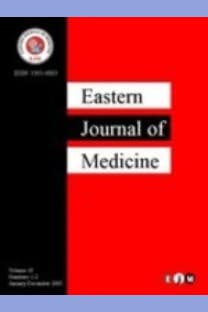Reactivation of Hepatitis B Virus Infection 66 months after Rituximab Therapy for Chronic Lymphocytic Leukemia, Emphasis on Interplay between Infection, Drugs and Disease Biology
___
1. Coluccio C, Begini P, Marzano A, et al. Hepatitis B in patients with hematological diseases: An update. World J Hepatol 2017; 9: 1043-1053.2. Perrillo RP, Gish R, Falck-Ytter YT. American Gastroenterological Association Institute technical review on prevention and treatment of hepatitis B virus reactivation during immunosuppressive drug therapy. Gastroenterology 2015; 148: 221-244.
3. Di Bisceglie AM, Lok AS, Martin P, et al. Recent US Food and Drug Administration warnings on hepatitis B reactivation with immune-suppressing and anticancer drugs: just the tip of the iceberg? Hepatology 2015; 61: 703-711.
4. Pel SN, Chen CH, Lee CM, Wand MC, Ma MC, Hu TH, Kuo CY. Reactivation of HepatitisB virus following rituximab based regimens aserious complication in both HbsAg positive and HbsAg negative patients. Ann Hematol 2010
5. Nakaya A, Fujita S, Satake A, et al. Delayed HBV reactivation in rituximab containing chemotherapy: How long should we continue anti-virus prophylaxis or monitoring HBV DNA? Leukemia Research 2016; 50: 46-49.
6. Muraishi J, Shibata M, Honma Y, et al. Reactivation of Occult Hepatitis B Virus Infection 27 Months after the End of Chemotherapy Including Rituximab for Malignant Lymphoma. Intern Med 2017; 56: 1967-1971.
7. Mozessohn L, Chan KK, Feld JJ, Hicks LK. Hepatitis B reactivation in HBsAgnegative/HBcAb-positive patients receiving rituximab for lymphoma: a meta-analysis. J Viral Hepat 2015; 22: 842-849.
8. Yagci M, Suyani E, Cakar MK. The Impact of Chemotherapy on Hepatitis B antibody Titer in patients with Hematological Malignancies. Turkish Journal of Hematology 2015; 32: 251- 256.
9. Hwang JP, Suarez-Almazor ME, Cantor SB, et al. Impact of the timing of hepatitis B virus identification and anti-hepatitis B virus therapy initiation on the risk of adverse liver outcomes for patients receiving cancer therapy. Cancer 2017; 123: 3367-3376.
- ISSN: 1301-0883
- Başlangıç: 1996
- Yayıncı: ERBİL KARAMAN
The Place of Preoperative Imaging Scans In Parathyroid Surgery
Sema YÜKSEKDAĞ, Ahmet TOPÇU, Fatma Gülçiçek AYRANCI, Esin CIBIROĞLU, Ethem ÜNAL
Prick Test Results and Total IgE Levels of Asthma Patients in A University Hospital
Barış ÇİL, Mehmet KABAK, İCLAL HOCANLI, Ayşe Füsun TOPÇU, MAHŞUK TAYLAN
Umblical Endometriosis: Presentation of A Rare Case
Pulmonary Adenocarcinoma Presented With LambertEaton Myasthenic Syndrome
Fettah EREN, Recep AYGÜL, Şerefnur ÖZTÜRK
Tuberculosis Cases in Mardin Between 2012 And 2018
Mehmet KABAK, Barış ÇİL, İCLAL HOCANLI, CENGİZHAN SEZGİ, MAHŞUK TAYLAN, Ufuk DÜZENLİ
Mesut OZGOKCE, Nuri HAVAN, Ferhat CUCE, Fatma DURMAZ, Zakir SAKCI
Factors Influencing the Ethical Sensitivity of Nurses Working in a University Hospital
Esma Ayşe ÖZTÜRK, ASUMAN ŞENER, ZELİHA KOÇ, LATİF DURAN
Mohamed FAİSAL, Rayhan AMİSENO, Nurashikin MOHAMMAD
Dosimetric Comparison of 3D-Conformal and IMRT Radiotherapy Techniques in Gastric Cancer
TAHİR ÇAKIR, Gökhan YILMAZER, TAYLAN TUĞRUL
Modality For Disseminated Intravascular Coagulation And Current Treatment
